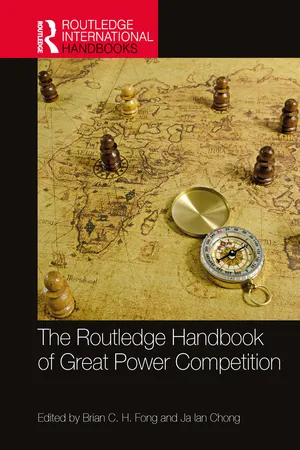
The Routledge Handbook of Great Power Competition
- 340 pages
- English
- ePUB (mobile friendly)
- Available on iOS & Android
The Routledge Handbook of Great Power Competition
About this book
The Routledge Handbook of Great Power Competition is a comprehensive, pioneering, and interdisciplinary guide of this re-emerging field.
Offering a team of cutting-edge researchers in the field, it advances an analytical framework of great power competition. It surveys the major theories (mainstream and critical), actors (state, quasi-state, and non-state), mechanisms (military, economic, and ideational influence), and domains (territorial and non-territorial) pertaining to contemporary great power competition.
This Handbook is an essential text for scholars and students of international relations, security studies, global governance, and comparative politics. It will also appeal to global policy makers and practitioners who need to observe contemporary great power competition.
Frequently asked questions
- Essential is ideal for learners and professionals who enjoy exploring a wide range of subjects. Access the Essential Library with 800,000+ trusted titles and best-sellers across business, personal growth, and the humanities. Includes unlimited reading time and Standard Read Aloud voice.
- Complete: Perfect for advanced learners and researchers needing full, unrestricted access. Unlock 1.4M+ books across hundreds of subjects, including academic and specialized titles. The Complete Plan also includes advanced features like Premium Read Aloud and Research Assistant.
Please note we cannot support devices running on iOS 13 and Android 7 or earlier. Learn more about using the app.
Information
Table of contents
- Cover Page
- Endorsement Page
- Half Title page
- Title Page
- Copyright Page
- Contents
- Illustrations
- Contributors
- The Great Power Competition Research Network (GPCRN)
- Introduction
- 1 Great Power Competition: An Analytical Framework
- Part I Theories, Actors, and Mechanisms
- Part II Territorial Domains
- Part III Non-Territorial Domains
- Conclusion
- Index